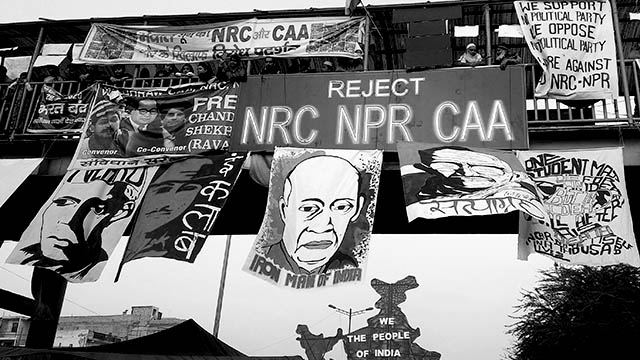Though the Rules of the CAA 2019 are notified now, millions of Bengali Hindu refugees won’t be able to apply for Indian citizenship under the CAA 2019. But why?
As India braces itself for the impending Lok Sabha elections, Prime Minister Narendra Modi resorted to his usual theatrics on Monday, March 11th, when he declared that his government would now enforce the contentious Citizenship (Amendment) Act, 2019 (CAA 2019), which was in the cold storage for over four years. Following Mr Modi’s announcement, the Rules of the CAA 2019 were notified the same night, after a four-year-long hiatus.
This strategic move by Mr Modi’s Bharatiya Janata Party (BJP) comes with a calculated bid to consolidate support among Bengali Hindu refugees who have entered India from Bangladesh. The latter have been harping their hopes on the BJP for their citizenship rights, ironically snatched away from them by the same party’s government in 2003, through the CAA 2003.
The CAA 2003 mandated the preparation of a nationwide National Register of Indian Citizens (NRIC or NRC), which will render the Bengali Hindu refugees, who migrated to India after the partition of Bengal, as illegal migrants, subject to disenfranchisement.
The Bengali Hindu refugees have been persecuted regularly since 2004 throughout West Bengal under the CAA 2003 by state agencies, which made it imperative for them to seek citizenship. The BJP has been exploiting this desperation of the Bengali Hindu refugees and deriving political dividends in the state.
Generally, the rules of any law are prepared by the bureaucracy within six months of its enactment. The unusually prolonged delay in notifying the Rules of the CAA 2019 was caused by the BJP’s desperate attempt to retain the halo of fallacy surrounding the law. Mr Modi’s government wasn’t willing to let the purported biggest beneficiary group of the CAA 2019—the Bengali Hindu refugees—realise that they won’t get citizenship under this law. The BJP didn’t want its support base among the Bengali Hindu refugees to erode, hence it concealed the Rules of the CAA 2019 for four years.
But why can’t the Bengali Hindu refugees get citizenship under the CAA 2019?
The CAA 2019 pertains solely to refugees from Afghanistan, Bangladesh and Pakistan belonging to six non-Muslim communities, Hindu, Buddhist, Jain, Sikh, Christian and Parsi, who migrated to India due to “religious persecution” on or before December 31st 2014 and have been exempted through the 2015 and 2016 amendments made to the Passport (Entry into India) Rules, 1950, and the Foreigners Order, 1948.
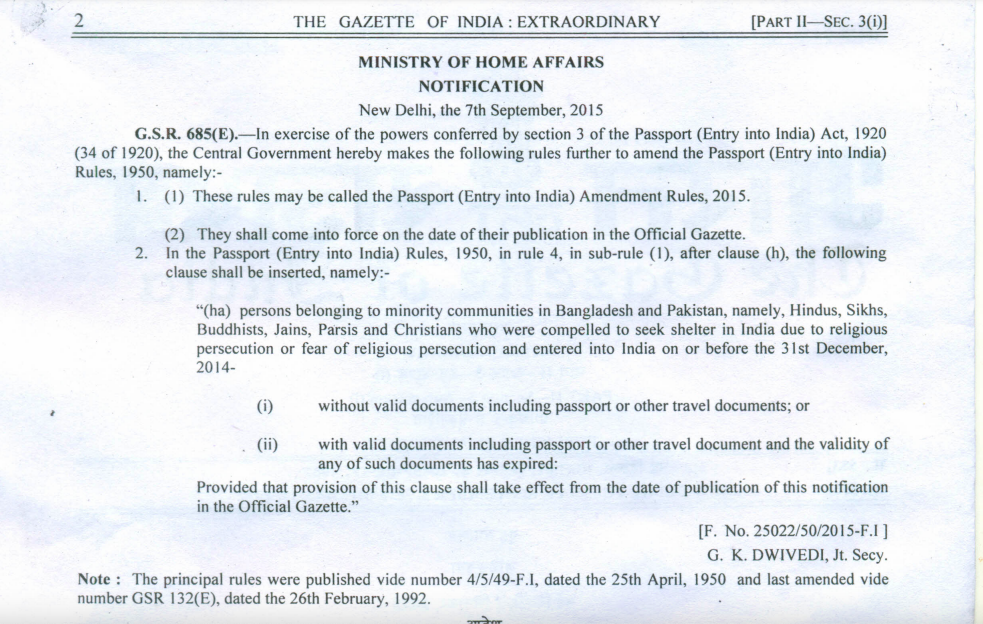
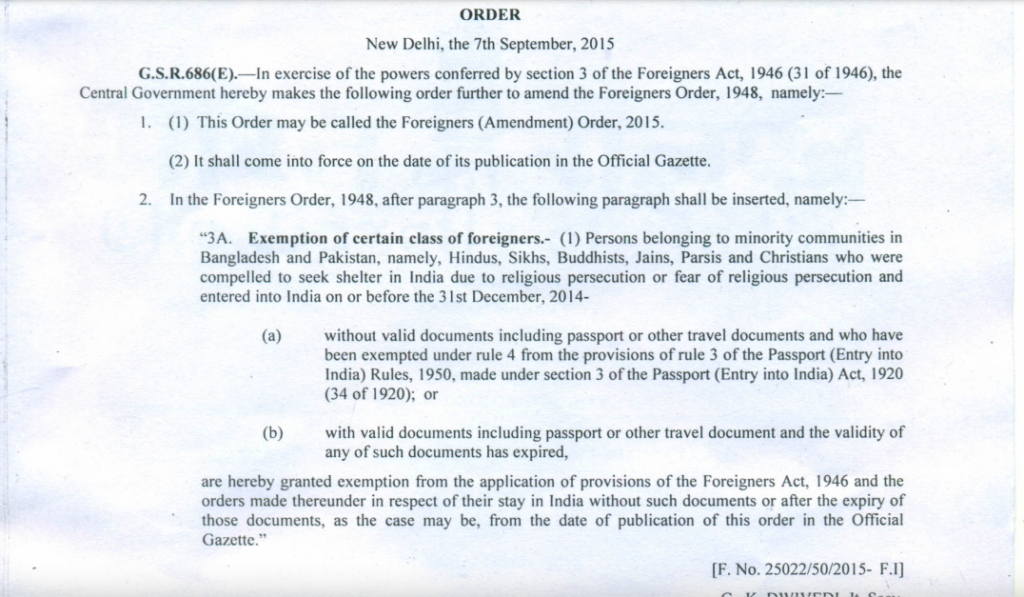
The law states that only those exempted under the above-stated amendments, won’t be considered as “illegal migrant” according to the CAA 2003.

Who all have been exempted by these amendments to the Passport (Entry into India) Rules, 1950, and Foreigners Order, 1948?
Only those from the above communities who have stated “religious persecution” as their reason for entering India have been exempted.
It means, that only those refugees, who, upon entering India, sought asylum or long-term visas at their nearest Foreigners Regional Registration Office (FRRO), have been exempted.
There were no promises of new concessions. The law doesn’t apply to anyone who isn’t exempted through such applications.
What’s the process to apply at an FRRO for someone who suffered religious persecution in their home country?
The Intelligence Bureau’s (IB) affidavit, on behalf of the Union Ministry of Home Affairs (MHA) before the Joint Parliamentary Committee (JPC) that reviewed the Citizenship (Amendment) Bill, 2016 (CAB 2016), which was the precursor to the CAA 2019 and had undergone two minor changes before it was passed by the Parliament, provided a detailed overview of the process.
According to point 2.14 of the JPC report on the CAB 2016, the IB, India’s internal intelligence agency, claimed:
“As per the Standard Operating Procedure (SOP) under preparation by MHA, for an applicant who applies with an affidavit mentioning that he/she was compelled to migrate to India due to religious persecution or fear of religious persecution, alongwith other supporting documents, a detailed enquiry will be conducted by Foreigners Regional Registration Office (FRRO)/Foreigners Registration Office (FRO) concerned to verify his/her claim. If the affidavit is not supported by documents, the case will be referred to Foreigners Tribunals to be constituted for this purpose under the Foreigners (Tribunals) Order, 1964 for verification of the claim regarding religious persecution.”
This is what the JPC asked the MHA representative regarding the evidence of “religious persecution”, which those seeking citizenship must submit to the FRRO for verification:
2.13 Asked to state the mechanism available with the Government to establish religious persecution in a foreign land, the MHA responded as under: “Inputs from security agencies alongwith other corroborative evidence in the print/electronic media would help to establish religious persecution in a foreign land.”
Here “Inputs from security agencies” means Indian intelligence operatives in the respective country.
But have millions of Namasudra and Matua community members arrived in India through the porous borders following the partition registered with the FRRO? Did they provide corroborative evidence to the FRRO?
The answer is no. Hence, none of the millions of Bengali Hindu refugees can qualify for the citizenship criteria set by the BJP government, which has hitherto dangled before them the bait of citizenship.
Contrary to what Mr Modi and Union Home Minister Amit Shah claim, or what the BJP projects, the CAA 2019 will grant citizenship rights to only 31,313 registered refugees, most of whom are likely to be people from Afghanistan and Pakistan who entered India using valid travel documents, registered themselves at the FRROs and got long-term visas to stay in India.
Here is what the IB’s affidavit to the JPC says (point 2.17)
“As per our records, there are 31,313 persons belonging to minority communities (Hindus - 25447, Sikhs - 5807, Christians - 55, Buddhists - 2 and Parsis - 2) who have been given Long Term Visa on the basis of their claim of religious persecution in their respective countries and want Indian Citizenship. Hence, these persons will be immediate beneficiaries (sic).”
A Right to Information application filed by this author in 2021, seeking the actual number of Bangladeshi nationals from the six communities mentioned in the CAA 2019 who have registered “religious persecution” as the reason behind their migration to India, was declined by the IB, using the immunity it has received under this law.
It indicates that the number of Bengali Hindu beneficiaries is quite lower than that of those who came from Afghanistan and Pakistan to India.
Consequently, Mr Modi and Mr Shah’s administration has left these communities with little recourse under the CAA 2019. Even if they attempt to apply for citizenship via the online portal, they are hampered by a lack of valid documentation.
As a cherry on top, the citizenship applications based on “religious persecution” would be verified by India’s external intelligence agency, the Research & Analysis Wing (R&AW). Upon verification of an applicant by the R&AW, the IB will further verify their antecedents, especially criminal records, during their stay in India. Only upon receiving clearance from both ends those who qualify for application can have their citizenship, albeit after decades considering the estimated number of applicants vis-à-vis R&AW operatives in these countries.

Despite assurances of impending relief to the Bengali Hindu refugees, mostly ostracised and marginalised Namasudra and Matua community members, the BJP delayed the notification of the Rules of the CAA 2019 to avoid getting caught, as the new law provides no legal basis for citizenship to these aggrieved communities living in India for decades.
Now even when the Rules of the CAA 2019 are notified, a careful analysis of it will prove how difficult it has made it for the Namasudras and Matuas to even apply for citizenship under this contentious amendment.
The Rules of the CAA 2019: A legal quagmire
Delving into the intricacies of the Rules of the CAA 2019 unveils a startling revelation—the very legislation touted to offer sanctuary to persecuted minorities in the neighbouring countries poses insurmountable barriers for the majority of Bengali Hindu refugees.
The CAA 2019, with its stringent criteria, renders millions ineligible for the promised respite.
Why?
The roadblocks of documentation:
Suppose a Namasudra or Matua tries to apply for Indian citizenship under the newly notified Rules of the CAA 2019 through a portal that the government has prepared. What will stop them from getting their citizenship?
The Rules of the CAA 2019 won’t go beyond the scope of the law. It means, these people who are applying, must have been exempted under the 2015 and 2016 amendments to the Passport (Entry into India) Rules, 1950 and Foreigners Order, 1948.
This is the first roadblock as most of these Bengali Hindu refugees have simply fled erstwhile East Pakistan (or present-day Bangladesh) facing severe violence, which prevented most of them from carrying the documents that they could’ve used to register themselves at the FRROs.
Unlike the upper-caste Bengali Hindu refugees, who came from the elite section of Bangladesh and due to their education and social status managed to excel at paperwork in India, the ostracised Namasudras, who were deprived of education or even a decent status in the Hindu society for ages, couldn’t get their paperwork following the partition, especially those who fled Bangladesh after the 1965 India-Pakistan war or the 1971 Bangladesh Liberation War.
Now what do the Rules of the CAA 2019 demand?
The Rules of the CAA 2019 demand that each application must be supported by one of the nine documents mentioned in Schedule 1A. Here is the list of accepted documents according to 1A.
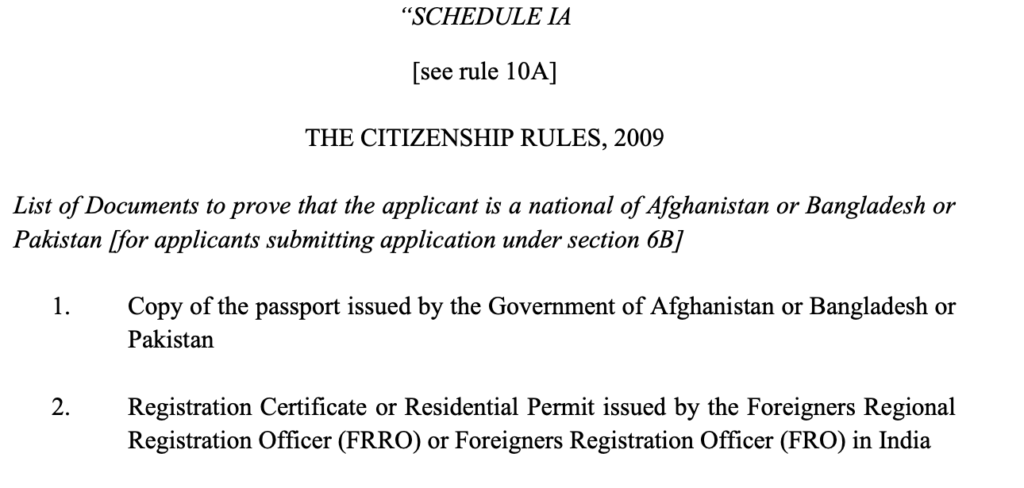
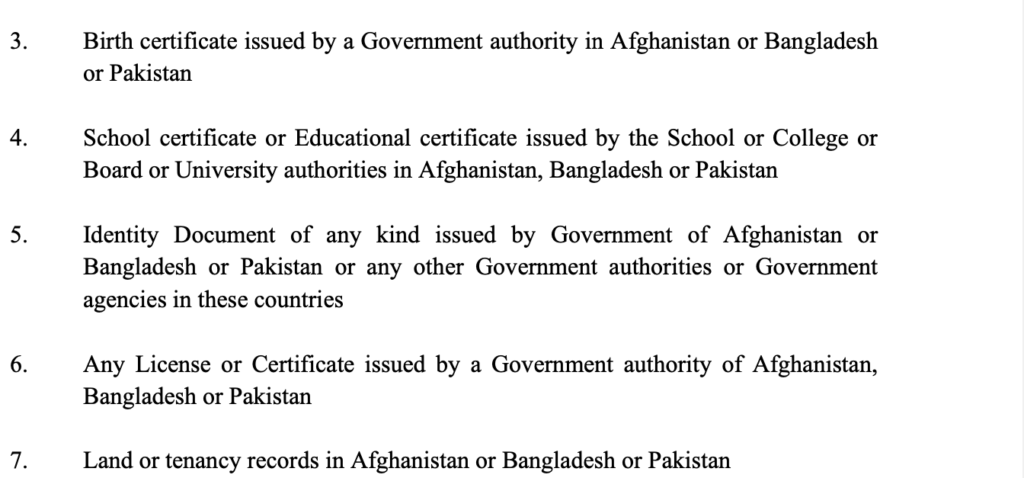
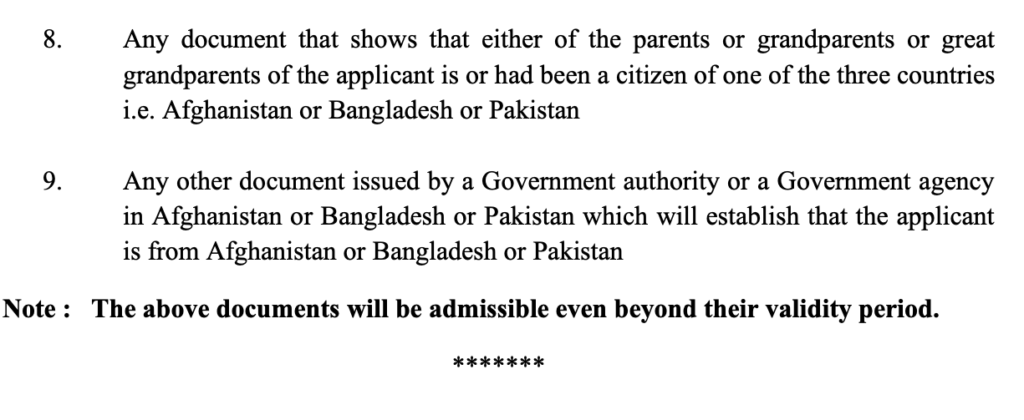
Apart from that the applicant also has to submit the proof of residence in India using any of the documents listed in Schedule 1B.
But here is also an interesting point. The IB deposed before the JPC that there will be tribunals to try those who have acquired Indian documents through “fraudulent means”.
“There will be many others who might have come and they might have already taken citizenship by various means. They might have obtained passport, ration card. All other documents they might have obtained and they might have already registered themselves in the voters list. So, for all practical purposes, they are already citizens of this country. Tribunals are already there to identify if any of them has obtained it by fraudulent means (sic).”
Therefore, to apply for citizenship under the CAA 2019, it’s mandatory to present any of the documents of the home country and those of India, which aren’t fraudulently obtained.
Now, when someone migrated to India years ago due to “religious persecution” but didn’t go to the FRRO to register themselves due to lack of evidence and documents, and they started living in India and gradually got all the documents, they not only will be denied citizenship due to lack of documents that prove their citizenship of the home country but also can be prosecuted for “fraudulently” obtaining Indian documents.
This is exactly what’s required by the affidavit that an applicant has to give as per Schedule 1C.
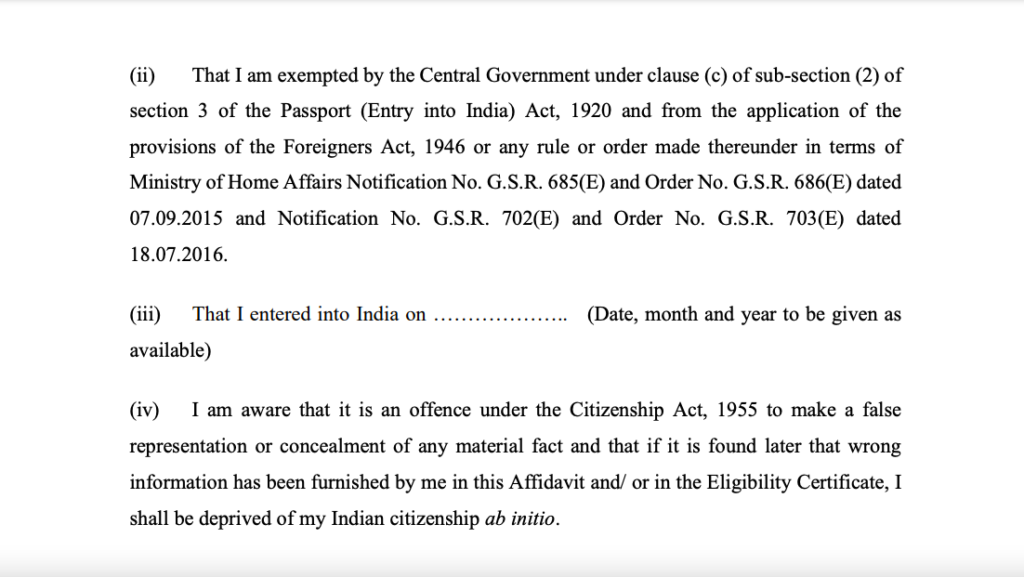
The affidavit clearly mentions that any fraudulent practice will lead to deprivation from Indian citizenship ab initio.
In this way, not only millions of genuine Bengali Hindu refugees will be denied citizenship, but they will also be disenfranchised and left without citizenship at all.
Navigating the complex bureaucratic requirements proves daunting for many Bengali Hindu refugees. The lack of valid documentation, compounded by historical circumstances, leaves them at a disadvantage.
The political bankruptcy of the Opposition
Millions of Bengali Hindu refugees have been living in Assam, Tripura and West Bengal for decades and strive for a life of dignity by getting recognised as Indian citizens. But none of India’s Opposition parties have been sympathetic to their demands.
Rather than building a strong movement demanding unconditional citizenship for all Bengali Hindu refugees, the Opposition has focused on creating a communal narrative out of the CAA fiasco, which fits perfectly in the BJP’s template.
From the left parties like the Communist Party of India (CPI) and CPI (Marxist) to the right-wing parties like the Congress or West Bengal’s ruling Trinamool Congress (TMC), all mainstream opponents of the BJP have accused the CAA 2019 of denying citizenship rights to the Muslims and alleged that it would only protect the Hindus from the NRC and disenfranchise Muslims.
Their claims are deceitful. Most Bengali Hindu refugees can’t avail of citizenship under the CAA 2019. This marginalised and ostracised bloc will be the first victims of the NRC exercise.
Now, rather than exposing this “anti-Hindu” approach of the BJP, they have helped the latter consolidate the Bengali Hindu refugees by calling the hollow Act “anti-Muslim”.
The statements of arch-rivals TMC supremo Mamata Bandopadhyay and the CPI(M) politburo match on the issue. The Congress’s stand is also identical. None of them took the effort to expose the fact that the BJP is hoodwinking the Bengali Hindus using the CAA 2019 as bait.
Their reluctance to do so can be traced to their unity with the BJP on the topic of NRC when they supported the CAA 2003 in the late former president Pranab Mukherjee-led Rajya Sabha panel.
The projection of the CAA 2019 as “anti-Muslim” will fuel more Islamophobia than help the Muslims and will continue to prevent unity between the Bengali Hindu refugees and the aboriginal Muslims and tribals against the BJP’s Hindutva agenda.
As political parties of the Opposition continue exhibiting their parochialism and refrain from exposing the BJP, millions of Bengali Hindus, mostly devoid of higher education, will be lured by the BJP with the promise of citizenship and taken through the path that will render them disenfranchised.
These disenfranchised people will be compelled to sell their labour at a cheaper rate, which will eventually bring down the overall labour rate in the market and help Indian corporates, who have been generously contributing to the BJP and other mainstream parties, in whopping up more profit.
As the political arena heats up over the Rules of the CAA 2019, the fate of the Namasudra and Matua communities hangs in the balance. Will history repeat itself, or will they avoid falling into the BJP’s trap again?
An avid reader and a merciless political analyst. When not writing then either reading something, debating something or sipping espresso with a dash of cream. Street photographer. Tweets as @la_muckraker

